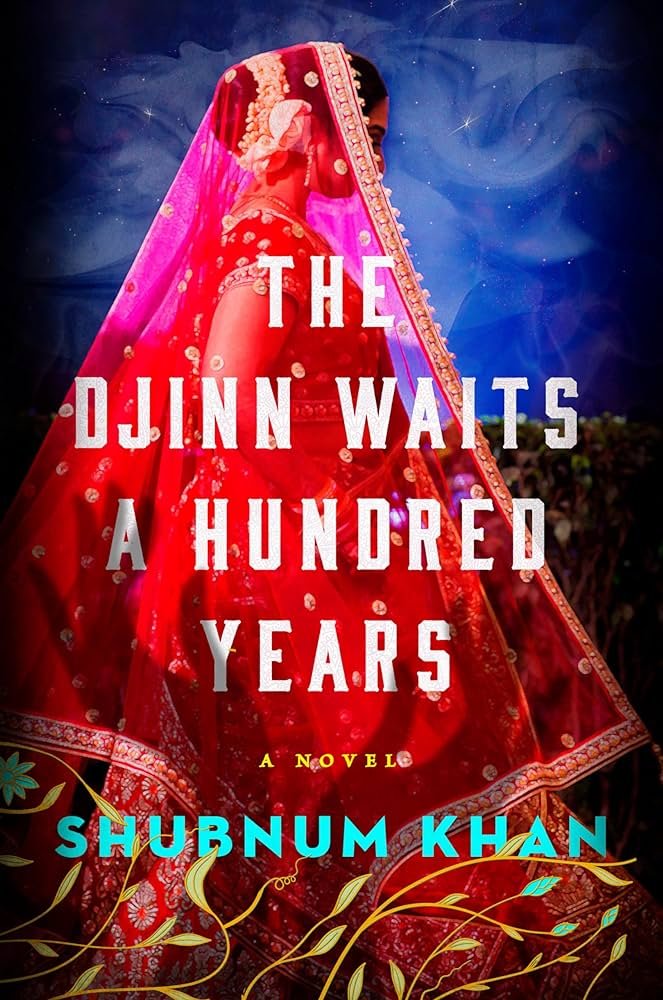The Djinn Waits a Hundred Years by Shubnum Khan
/The Djinn Waits a Hundred Years
By Shubnum Khan
Viking, 2024
The Djinn Waits a Hundred Years is a new historical fiction novel from South African author Shubnum Khan. This book tells the story of a young girl named Sana Malek who moves with her father Bilal to an apartment inside Akbar Manzil—an old mansion that was once known for its discordant mix of, “Palladian windows, marble parapets, Romanesque towers, and golden domes,” but is now better known for leaky pipes and unreliable electricity. As Sana begins to explore the house, she finds a room that has been closed off for eighty-two years. Investigating this space leads Sana to uncover the story of the first people to live there: Jahanara and Akbar Ali Khan. A newlywed couple from India, Jahanara and Akbar are on a trip to explore Africa when Akbar decides at the spur of the moment to move his new family to South Africa permanently. What happens next is both tragic and, in some ways, inevitable.
Where this novel really shines is the characters. Still working through her grief over her mother’s death, Sana is seen as quiet and understated by the other characters. She’s so quiet that she practically, “begins to disappear into the furniture, against walls; her bare ends blending into things like the end of a brushstroke.” She’s also a curious, intuitive girl. Her near invisibility gives Sana the freedom to move around without drawing attention to herself. Exploring Akbar Manzil and investigating the original owners of the property starts to bring Sana out of her shell for the first time in years.
The original inhabitants of the house, Jahanara and Akbar Ali Khan, have an uncomfortable relationship. Akbar is a businessman and entrepreneur ever striving for more; more wealth, more success, more ostentatious additions to his backyard menagerie. Jahanara is a woman who wants desperately to embody the grace and sophistication that she believes epitomizes English society—so deep is her desire to embody this perception of Englishness that she decorates their home in a way that is reminiscent of an English country estate and dresses only in styles popular with English ladies. Where Akbar is enchanted by South Africa, Jahanara is repelled.
Akbar and Jahanara are at odds from the very beginning, but their relationship is made all the worse by the introduction of an overbearing mother-in-law who finds everything Jahanara does to be lacking or worse, too English. Jahanara and her mother-in-law soon find themselves, “locked in an ancient battle of the civilizations,” that neither party is willing to walk away from. This is a very unhappy family. The evolution of the relationship between Akbar and Jahanara from newlyweds to disgruntled, even bitter, roommates is tragic yet captivating. The fundamental incompatibility of the characters, neither of whom are particularly likeable, causes a slow and inevitable breakdown in communication throughout the novel as their relationship deteriorates.
The modern-day inhabitants of Akbar Manzil are colorful, lively, and a stark contrast to the other inhabitants of the house. They are a quirky group of older people and a housekeeper who will go to any lengths to not keep house. The banter between these characters is done very well. They argue, they fight, they insult each other, they throw an awkward dinner party. They are an unexpectedly hilarious part of a narrative which is otherwise full of unlikeable characters making unlikeable choices.
Unfortunately, The Djinn Waits a Hundred Years is marketed as both historical fiction and horror. This is misleading. While the house is decrepit, it isn’t creepy and atmospheric in the way readers of Gothic horror might expect. And though there are a few scenes in the back half of the book that would not be out-of-place in a slightly more graphic horror novel, this is not enough to make this a horror novel. Readers coming to this book hoping for strong horror elements are going to be disappointed.
So what is this book? The Djinn Waits a Hundred Years is a multi-generational saga. It’s a romance. It’s a tragedy. It’s a mystery. It’s a quirky roommate comedy. It’s about dealing with grief and finding a way forward after a tragic loss. It’s a revenge story. There’s commentary about the Indian experience in South Africa. There’s a coming-of-age narrative with Sana learning to deal with and move past the grief she’s experiencing. There’s a lot going on, arguably too much. And it’s such a short book (only 320 pages!) for the sheer number of things it’s trying to do, which unfortunately leaves a few of the plotlines feeling underdeveloped.
The Djinn Waits a Hundred Years may leave a bit to be desired for readers who are looking for a novel that is both historical fiction and horror. On the other hand, readers who initially avoided this book because of the horror categorization should not let that scare them away from picking it up. Overall, The Djinn Waits a Hundred Years is a colorful U.S. debut from Shubnum Khan, perfect for readers who like quirky, colorful, and sometimes unlikable characters.
Amberlee Venters is a freelance editor and writer living in Northern California.
